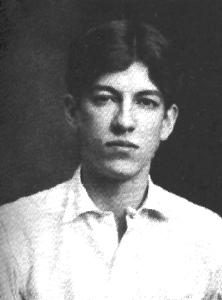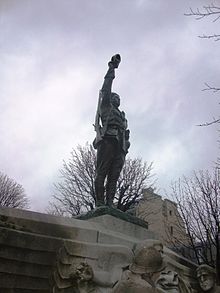In Paris, about six blocks southeast of the Arch of Triumph, is a small park called Place des Etats-Unis, or United States Park, though sometimes called Square Thomas Jefferson. The streets on all four sides of the park are lined with beautiful, historical mansions which have served as embassies, residences for princes, and one for the patron of Jean Cocteau. Another was occupied by the Gestapo during WWII. The American novelist, Edith Wharton lived for a time in one house, while in another lived a Viscountess who threw parties for the likes of Pablo Picasso, Balthus, Henri Matisse, and Salivador Dali. It's a nice neighborhood.
 There are three monuments in the park. One is of Marquis de La Fayette shaking hands with George Washington, designed by sculptor Frederic-Auguste Bartholdi, designer of the Statue of Liberty, standing in New York Harbor. There is an exact replica of the La Fayette - Washington monument in Morningside Park in New York, up in Harlem. The figures are double size.
There are three monuments in the park. One is of Marquis de La Fayette shaking hands with George Washington, designed by sculptor Frederic-Auguste Bartholdi, designer of the Statue of Liberty, standing in New York Harbor. There is an exact replica of the La Fayette - Washington monument in Morningside Park in New York, up in Harlem. The figures are double size.The second monument is one of a person you may either bless or curse when in the dentist's office - an American dentist, Horace Wells, an early inventor of an anesthesia, nitrous oxide or laughing gas. A sad story there. He learned of the effects of the gas in a circus, performed a few successful extractions using it, but then became addicted to chloroform and so deranged from it he committed a crime by throwing acid onto two prostitutes. He committed suicide in remorse. For some reason my dentist finds this story amusing; but then, he finds McTeague, by Frank Norris, amusing. Both the American Dental and Medical Associations honored Wells posthumously in1864, and have credited him as the discoverer of modern anesthesia.
The third monument is of Alan Seeger, a poet who was born in New York and lived part of his his adolescence in Mexico. He returned to the US to attend Harvard college, becoming an editor of the Harvard Monthly where he regularly submitted his poetry. After graduation, Seeger lived a bohemian lifestyle in Greenwich Village for two years, moving to Paris in 1912. After the outbreak of WWI he joined the French Foreign Legion, serving in the trenches on the Western Front. During quiet hours of guard duty he composed verse.
In 1915 he wrote in a letter, "If it must be, let it come in the heat of action. Why flinch? It is by far the noblest form in which death can come. It is in a sense almost a privilege. . ."

Rendezvous - by Alan Seeger
I have a rendezvous with Death
At some disputed barricade,
When Spring comes back with rustling shade
And apple-blossoms fill the air--
I have a rendezvous with Death
When Spring brings back blue days and fair.
At some disputed barricade,
When Spring comes back with rustling shade
And apple-blossoms fill the air--
I have a rendezvous with Death
When Spring brings back blue days and fair.
It may be he shall take my hand
And lead me into his dark land
And close my eyes and quench my breath--
It may be I shall pass him still.
I have a rendezvous with Death
On some scarred slope of battered hill,
When Spring comes round again this year
And the first meadow-flowers appear.
And lead me into his dark land
And close my eyes and quench my breath--
It may be I shall pass him still.
I have a rendezvous with Death
On some scarred slope of battered hill,
When Spring comes round again this year
And the first meadow-flowers appear.
 God knows 'twere better to be deep
God knows 'twere better to be deepPillowed in silk and scented down,
Where love throbs out in blissful sleep,
Pulse nigh to pulse, and breath to breath,
Where hushed awakenings are dear . . .
But I've a rendezvous with Death
At midnight in some flaming town,
When Spring trips north again this year,
And I to my pledged word am true,
I shall not fail that rendezvous.
Alan Seeger was killed at Belloy-en-Santerre
on July 4, 1916, after being hit several times by machine gun fire, said while cheering on his fellow soldiers in a
successful charge.
Ode in Memory of the American Volunteers Fallen for France - by Alan Seeger
(To have been read before the statue of Lafayette and Washington in Paris, on Decoration Day, May 30, 1916). First, fifth stanzas.IAy, it is fitting on this holiday,
Commemorative of our soldier dead,
When -- with sweet flowers of our New England May
Hiding the lichened stones by fifty years made gray --
Their graves in every town are garlanded,
That pious tribute should be given too
To our intrepid few
Obscurely fallen here beyond the seas.
Those to preserve their country's greatness died;
But by the death of these
Something that we can look upon with pride
Has been achieved, nor wholly unreplied
Can sneerers triumph in the charge they make
That from a war where Freedom was at stake
America withheld and, daunted, stood aside.
V
There, holding still, in frozen steadfastness,
Their bayonets toward the beckoning frontiers,
They lie -- our comrades -- lie among their peers,
Clad in the glory of fallen warriors,
Grim clusters under thorny trellises,
Dry, furthest foam upon disastrous shores,
Leaves that made last year beautiful, still strewn
Even as they fell, unchanged, beneath the changing moon;
And earth in her divine indifference
Rolls on, and many paltry things and mean
Prate to be heard and caper to be seen.
But they are silent, calm; their eloquence
Is that incomparable attitude;
No human presences their witness are,
But summer clouds and sunset crimson-hued,
And showers and night winds and the northern star.
Nay, even our salutations seem profane,
Opposed to their Elysian quietude;
Our salutations calling from afar,
From our ignobler plane
And undistinction of our lesser parts:
Hail, brothers, and farewell; you are twice blest, brave hearts.
Double your glory is who perished thus,
For you have died for France and vindicated us.
Their bayonets toward the beckoning frontiers,
They lie -- our comrades -- lie among their peers,
Clad in the glory of fallen warriors,
Grim clusters under thorny trellises,
Dry, furthest foam upon disastrous shores,
Leaves that made last year beautiful, still strewn
Even as they fell, unchanged, beneath the changing moon;
And earth in her divine indifference
Rolls on, and many paltry things and mean
Prate to be heard and caper to be seen.
But they are silent, calm; their eloquence
Is that incomparable attitude;
No human presences their witness are,
But summer clouds and sunset crimson-hued,
And showers and night winds and the northern star.
Nay, even our salutations seem profane,
Opposed to their Elysian quietude;
Our salutations calling from afar,
From our ignobler plane
And undistinction of our lesser parts:
Hail, brothers, and farewell; you are twice blest, brave hearts.
Double your glory is who perished thus,
For you have died for France and vindicated us.
Seven years to the day after Seeger was killed, on 4 July 1923, the President of the French Council, Raymond Poincaré, dedicated the monument in the Place des États-Unis to the 24 Americans who had volunteered to fight in World War I in the service of France.
It is inscribed:
"They did not pursue worldly rewards; they wanted nothing more than to
live without regret, brothers pledged to the honor implicit in living
one's own life and dying one's own death. Hail, brothers! Goodbye to
you, the exalted dead! To you, we owe two debts of gratitude forever:
the glory of having died for France, and the homage due to you in our
memories."
"I Have a Rendezvous with Death" was one of President Kennedy's favorite poems. His wife Jacqueline often recited it for him.
Seeger's collected work, Poems was published posthumously and was not very successful, because, it was said, the language and ideals were too lofty. It was reviewed by one of his Harvard classmates, T.S. Eliot:
"Seeger was serious about his work and spent pains over it. The work
is well done, and so much out of date as to be almost a positive
quality. It is high-flown, heavily decorated and solemn, but its
solemnity is thorough going, not a mere literary formality. Alan
Seeger, as one who knew him can attest, lived his whole life on this
plane, with impeccable poetic dignity; everything about him was in
keeping."
Alan Seeger's brother Charles, a noted musicologist, was the father of the American folk singer, Pete Seeger.
Very good Memorial Day post. The Pete Seeger connection is poignant, as Pete has devoted his life to singing for peace, and the Eliot review is a remarkable find.
ReplyDelete